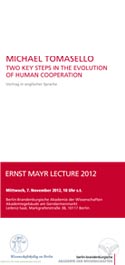
Die Ernst Mayr Lecture ist eine von der Berlin-Brandenburgischen Akademie der Wissenschaften und dem Wissenschaftskolleg zu Berlin gestiftete Vorlesungsreihe auf dem Gebiet der Biowissenschaften. Mit der im Zweijahresrhythmus stattfindenden Vorlesung soll – dem Titel eines der Hauptwerke des Ornithologen und Evolutionsbiologen Ernst Mayr (1904 –2005) folgend (The Growth of Biological Thought) – die Entwicklung des biologischen Denkens von führenden Wissenschaftlerinnen und Wissenschaftlern verschiedener Disziplinen einer breiteren Öffentlichkeit vermittelt werden. Ernst Mayr hatte im Herbst 1997 die nach ihm benannte Vorlesungsreihe eröffnet.
Die Ernst Mayr Lecture 2012 hält Michael Tomasello. Sie trägt den Titel "Two Key Steps In The Evolution Of Human Cooperation". Michael Tomasello ist Direktor der Abteilung für vergleichende und Entwicklungspsychologie am Max-Planck-Institut für Evolutionäre Anthropologie in Leipzig. Professor Tomasellos
Forschungsinteressen gelten den Prozessen sozialer Wahrnehmung, sozialen Lernens und der Kommunikation / Sprache bei Kindern und Menschenaffen.
PROGRAMM
Begrüßung
Günter Stock
Präsident der Berlin-Brandenburgischen
Akademie der Wissenschaften
Einführung
Lorraine Daston
Direktorin am Max-Planck-Institut
für Wissenschaftsgeschichte
Permanent Fellow des Wissenschaftskollegs zu Berlin
Two Key Steps In The Evolution
Of Human Cooperation
Michael Tomasello
Direktor am Max-Planck-Institut
für Evolutionäre Anthropologie, Leipzig
!Vortrag in englischer Sprache!
Modern theories of the evolution of human cooperation focus mainly on altruism. In contrast, we propose that humans‘ species-unique forms of cooperation – as well as their speciesunique forms of cognition, communication, and social life – all derive from mutualistic collaboration (with social selection against cheaters). In a first step, humans became obligate collaborative foragers such that individuals were inter‑dependent with one another and so had a direct interest in the well-being of their partners. In this context they evolved new skills and motivations for collaboration not possessed by other great apes (joint intentionality), and they helped their potential partners (and avoided cheaters). In a second step, these new collaborative skills and motivations were scaled up to group life in general as modern humans faced competition from other groups. As part of this new group-mindedness, they created cultural conventions, norms, and institutions (all characterized by collective intentionality), with knowledge of a specific set of these marking individuals as members of a particular cultural group. Human cognition and sociality thus became ever more collaborative and altruistic as human individuals became ever more interdependent.

